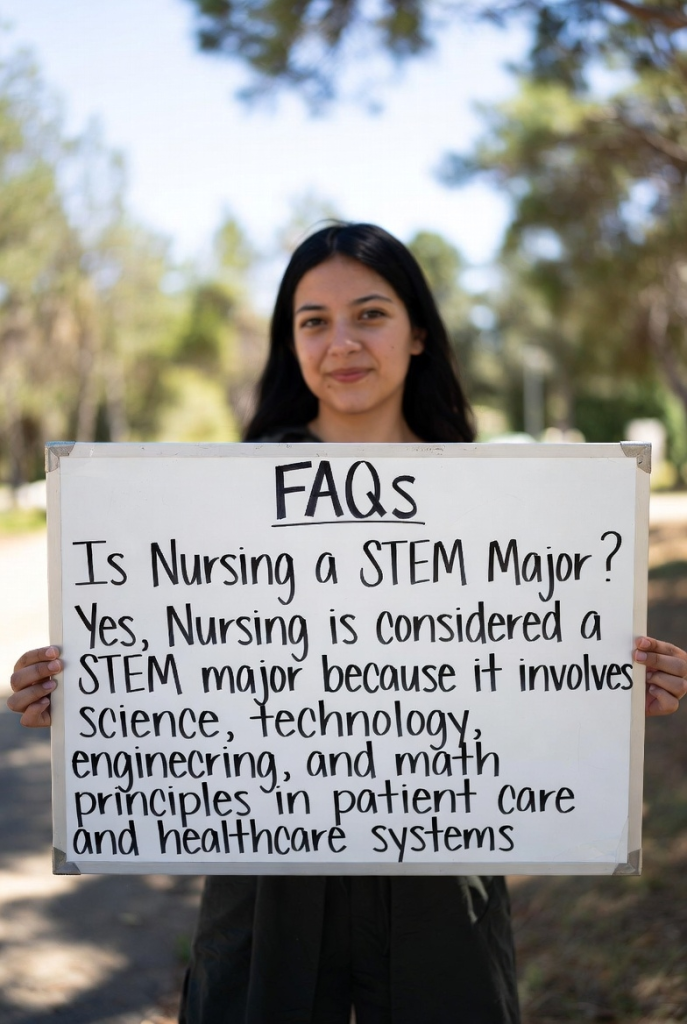
By EssayAssits.com
Introduction
In today’s rapidly evolving world, the boundaries between traditional academic disciplines are becoming increasingly blurred. Fields once seen as purely technical, like engineering or computer science, now intersect with healthcare, education, and social sciences. One of the biggest questions students often ask is: “Is nursing a STEM major?”
At first glance, nursing may seem distinct from science or technology-driven fields — it’s centered on patient care, empathy, and communication. However, beneath that compassionate surface lies a profession deeply rooted in science, data, and innovation. From understanding complex biological systems to operating advanced medical technologies, nursing embodies the core principles of STEM — Science, Technology, Engineering, and Mathematics.
In this blog, EssayAssits.com explores whether nursing should be officially recognized as a STEM major, examining both sides of the debate and what this means for students, educators, and the future of healthcare.
What Is a STEM Major?
A STEM major is any academic discipline that falls under the categories of Science, Technology, Engineering, and Mathematics. These programs are designed to develop critical thinking, problem-solving, and analytical skills — preparing students to innovate, conduct research, and apply scientific methods to real-world challenges.
STEM majors typically emphasize evidence-based learning, quantitative reasoning, and technological proficiency. Students in these fields often engage in experiments, data analysis, software use, and research projects that advance both academic knowledge and practical solutions.
Common examples of STEM majors include:
- Biology, Chemistry, and Physics (Science)
- Computer Science, Data Analytics, and Information Systems (Technology)
- Civil, Mechanical, and Biomedical Engineering (Engineering)
- Mathematics, Statistics, and Actuarial Science (Mathematics)
While nursing is traditionally categorized as a healthcare profession, it shares much of the same foundation as STEM fields — from anatomy and pharmacology to medical informatics and data-driven decision-making. This overlap has sparked an important question in education and policy: Should nursing be officially recognized as a STEM major?
Why Nursing Can Be Considered a STEM Major

Nursing is much more than bedside care — it’s a dynamic, evidence-based discipline that integrates scientific knowledge, technological expertise, and analytical reasoning. For this reason, many educators and professionals argue that nursing fits squarely within the STEM framework. Here’s why:
1. Nursing Is Grounded in Science
From anatomy and physiology to microbiology and pharmacology, nursing education is built on a strong scientific foundation. Nurses must understand complex biological systems, how diseases progress, and how medications interact within the body. This deep scientific knowledge guides every clinical decision they make.
2. Technology Plays a Central Role
Modern nursing relies heavily on medical technology — from electronic health records (EHRs) and diagnostic tools to wearable monitors and telehealth platforms. Nurses must master these technologies, interpret data, and ensure that patients receive accurate, efficient, and safe care. This technological fluency aligns perfectly with the “T” in STEM.
3. Mathematics Is Essential to Patient Safety
Math may not be the first thing people associate with nursing, but it’s a daily necessity. Nurses calculate medication dosages, IV flow rates, and nutritional requirements with precision. Even small errors can have serious consequences, which makes numerical accuracy and data interpretation vital to the profession.
4. Critical Thinking and Problem-Solving Are Core Skills
Just like engineers or data scientists, nurses are trained to assess complex problems and develop solutions under pressure. They analyze patient symptoms, interpret lab results, and create evidence-based care plans — all of which require analytical reasoning and logical thinking.
5. Nursing Research Advances Science and Technology
Many nurses contribute to clinical and academic research, exploring innovations in patient care, healthcare systems, and medical technology. Their work drives improvements in public health, chronic disease management, and healthcare policy — demonstrating that nursing not only applies science but also expands it.
In essence, nursing combines all four pillars of STEM — science, technology, engineering (through systems thinking), and mathematics — in ways that directly impact human health. That’s why more experts, universities, and organizations are calling for nursing to be recognized as a true STEM major.
Why Nursing Isn’t Always Classified as STEM
Despite its strong foundation in science, technology, and mathematics, nursing is not universally recognized as a STEM major. There are several reasons for this classification gap:
1. Focus on Patient Care Over Research
Nursing is primarily a practice-based profession centered on direct patient care, rather than laboratory research or technology development. While nurses apply scientific principles daily, the field is often viewed as less “research-intensive” compared to traditional STEM disciplines like engineering or computer science.
2. Inconsistent Classification Across Institutions
Not all educational systems or government bodies include nursing under STEM. For instance, some scholarship programs or visa regulations limit STEM benefits to fields like biology, engineering, or IT, leaving nursing outside the official STEM category.
3. Societal Perception and Historical Bias
Nursing is widely associated with caregiving, empathy, and soft skills, which, while essential, can overshadow its scientific and technical components. Historical gender biases — given that nursing is a female-dominated profession — have also influenced how STEM classification decisions are made.
4. Variation in Curriculum
Not all nursing programs emphasize advanced science, technology, or mathematics to the same degree. Differences in course content, research opportunities, and clinical technology exposure mean that some programs align more closely with STEM principles than others.
5. Policy and Funding Limitations
Because nursing is often not classified as STEM, students may miss out on certain STEM scholarships, grants, or research funding opportunities. This institutional gap reinforces the perception that nursing falls outside STEM.
In summary, while nursing embodies many STEM principles in practice, structural, societal, and institutional factors have prevented it from being consistently recognized as a STEM major. Nevertheless, the growing integration of technology, research, and evidence-based practice is gradually changing this perception.
How Nursing Could Gain Full STEM Recognition
While nursing already embodies the core principles of STEM — science, technology, engineering, and mathematics — it is not always officially recognized as a STEM major. To close this gap, several strategies can help nursing achieve full STEM recognition:
1. Standardize STEM Classification for Nursing
Educational institutions, professional organizations, and government agencies need to adopt a consistent definition of STEM that explicitly includes nursing. Clear classification would help ensure nursing students can access STEM-designated scholarships, research opportunities, and policy benefits.
2. Highlight Science and Technology in the Curriculum
Nursing programs can emphasize advanced scientific coursework, technological proficiency, and data analytics. By making these elements more visible, schools can demonstrate that nursing education aligns closely with STEM objectives.
3. Promote Evidence-Based Research
Encouraging nurses to participate in clinical and academic research strengthens the field’s connection to STEM. Nursing research contributes to innovations in patient care, medical technology, and healthcare systems — all key areas of STEM impact.
4. Shift Public Perception
Campaigns and educational initiatives can help the public understand that nursing is a science-driven profession, not solely a caregiving role. Highlighting the technological, analytical, and research aspects of nursing can reshape societal understanding.
5. Policy and Funding Support
Governments, educational authorities, and funding bodies should extend STEM-related scholarships, grants, and visas to nursing students and professionals. Policy support reinforces the official recognition of nursing as part of the STEM ecosystem.
6. Integrate Systems and Engineering Thinking
Nurses often engage in process optimization, workflow design, and healthcare systems management, which involve engineering-style problem solving. Formally acknowledging this aspect can further strengthen the STEM argument.
By implementing these strategies, nursing can not only gain full recognition as a STEM major but also inspire more students to pursue the field, knowing it combines rigorous scientific training with impactful, technology-driven healthcare practice.
Final EssayAssits Thoughts

So, is nursing a STEM major? The answer is both yes and no. On one hand, nursing clearly incorporates the core elements of STEM: rigorous science, advanced technology, critical mathematics, and analytical problem-solving. Modern nurses rely on evidence-based practice, operate sophisticated medical equipment, and contribute to research that advances healthcare — all hallmarks of STEM.
On the other hand, nursing is not always officially classified as a STEM field. Societal perceptions, historical biases, variations in curriculum, and inconsistent institutional definitions have kept nursing outside the formal STEM category in many contexts.
At EssayAssits.com, we believe that nursing deserves full recognition as a STEM major. It is a profession where science meets compassion, technology meets human care, and analytical reasoning saves lives every day. For students considering nursing, this means you’ll gain STEM-level skills while making a tangible impact on people’s health and well-being.
Nursing proves that STEM is not only about laboratories, equations, and code — it’s about applying science and technology to solve real-world problems, improving lives one patient at a time.
FAQs: Is Nursing a STEM Major?

Nursing Concept Map: A Guide with Templates — The EssayAssits Way
1. Is nursing officially considered a STEM major?
Not always. While nursing incorporates science, technology, engineering-style thinking, and mathematics, it is not universally classified as STEM by all educational institutions or government agencies.
2. Why do people argue that nursing is a STEM field?
Nursing involves:
- Rigorous scientific coursework (anatomy, physiology, pharmacology)
- Advanced technology (medical devices, health informatics)
- Mathematics and data analysis (dosage calculations, interpreting patient data)
- Critical thinking and problem-solving
These are all core STEM principles.
3. Why isn’t nursing always recognized as STEM?
Nursing is often viewed as practice-based and care-focused, with less emphasis on research in some programs. Additionally, societal perceptions, historical gender biases, and inconsistent policy classifications contribute to its exclusion from STEM in many contexts.
4. Can nursing students benefit from STEM-related scholarships or programs?
It depends on the institution or country. Some programs may offer STEM benefits to nursing students, especially those in research-intensive or technology-focused tracks, but official STEM recognition varies.
5. How can nursing gain full recognition as a STEM major?
Strategies include:
- Standardizing STEM classification to include nursing
- Emphasizing science, technology, and mathematics in the curriculum
- Promoting nursing research and innovation
- Raising public awareness of nursing as a science-driven profession
- Expanding STEM-related policy support and funding
6. Why does it matter whether nursing is considered STEM?
Recognition as a STEM major can open scholarships, research opportunities, visas, and career pathways. It also highlights the profession’s scientific and technological rigor, attracting students interested in both healthcare and STEM.
7. Is nursing still a good choice for students interested in STEM careers?
Absolutely. Nursing combines STEM-level skills with hands-on healthcare experience, making it a unique and impactful career path where science and compassion intersect.
